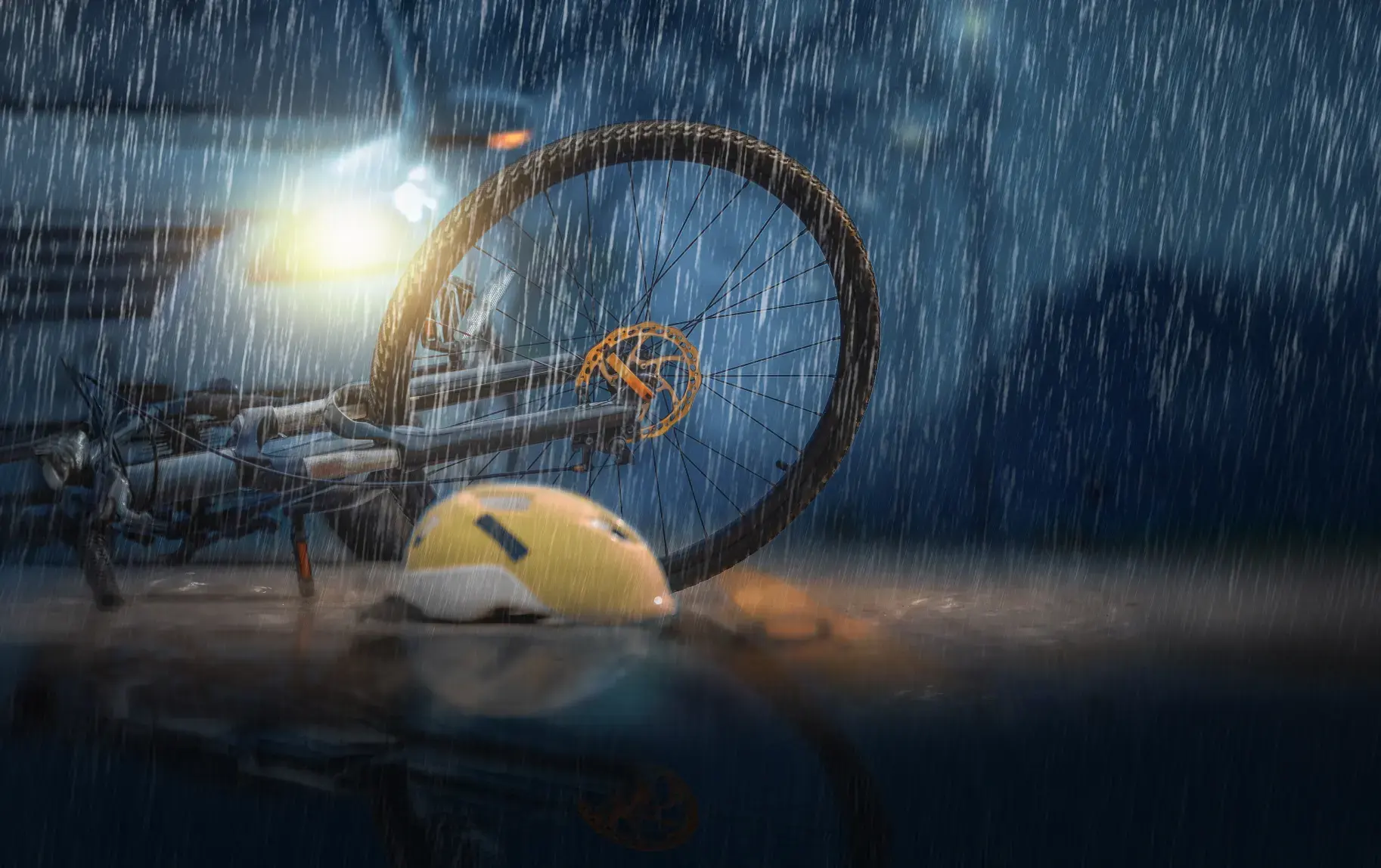Suddenly The Roads Become More Dangerous
This is the most hazardous time of year for cyclists, pedestrians and those motorcyclists who are prepared to (or forced to) brave the miserable conditions.
Darker nights and bad weather are a deadly combination – as our personal injury lawyers can testify from experience, based on the numbers of calls they receive.
Injured In A Road Accident? Claim Compensation – No Win No Fee
Changing The Clocks Puts Road-Users At Risk
It always gets worse when the clocks go back. Overnight, this country’s potholed roads suddenly become even more dangerous for cyclists, pedestrians and motorcyclists.
Twilight turns into darkness an hour earlier – reducing crucial visibility. And all because Britain persists in changing its clocks twice a year. Most countries sensibly don’t – only a third still do.
Death Toll On Britain’s Roads
There were 74,157 accidents on Britain’s roads in 2023, according to latest data from the Office for National Statistics.
That’s just over 203 road accidents every day – at least eight every hour. Of those accidents:
- 1.4% were fatal
- 4.1% resulted in “very serious” injuries for the casualties
- 5.0% – “moderately serious” injuries.
In the remaining 89.5% of accidents, the injuries were “less serious” or “slight”.
But as experienced road accident solicitors, we can tell you that even cars travelling at comparatively lower speeds such as 20mph or 30mph can do terrible damage to the human body.
I recall how one client suffered nasty leg injuries after being hit by a car being driven reasonably slowly across a car park.
So please be careful out there.
Injuries To Cyclists And Pedestrians
Our heart goes out to vulnerable cyclists, pedestrians and motorcyclists, especially at this time of year. There is always a significant increase in the number of accidents in late October – right from the very day the clocks change.
It’s as sudden and as depressingly inevitable as that. And in our experience, it’s the cyclists who are most likely to be injured.
Pedestrians have the safety of the pavement; they’re exposed to danger only when they cross the road. And many motorcyclists – all but the diehards – tend to use the car instead when the weather turns nasty.
But many cyclists are out on the roads in all weathers: some because they have no choice – the trusty bicycle represents the only wheels they own.
Cycle Accidents – What The Latest Data Shows
Between 2019 and 2023, an average of two cyclists died and 80 were seriously injured every week in Britain. ONS data shows that:
- 46% of cycle fatalities involved a collision with a car
- 58% of cycle fatalities occurred on rural roads (compared with 31% of traffic)
- 82% of cyclists killed or seriously injured were male.
The main contributory factor was that the cyclist or the vehicle driver (or both) failed to look properly. This can have major consequences at any time of year. But in the long, dark and rainy evenings of winter it’s absolutely lethal.
The only good news is that injuries to cyclists in road accidents across Britain have fallen over the last three years:
- 2023 – 87 deaths; 3,942 serious injuries; 14,999 all casualties
- 2022 – 91 deaths; 4,045 serious injuries; 15,693 all casualties
- 2021 – 111 deaths; 4,285 serious injuries; 16,458 all casualties
- 2020 – 141 deaths; 4,268 serious injuries; 16,294 all casualties
- 2019 – 100 deaths; 4,164 serious injuries; 16,883 all casualties.
By far the most typical accident scenario is that of a cyclist in collision with a car. Between 2019 and 2023 it accounted for 242 deaths and 14,894 serious injuries .
How to claim compensation for a cycling accident.
E-Scooter Rider Deaths And Injuries
Seven e-scooter riders died in accidents in the year ended June 2023 with:
- 316 more seriously injured
- 754 more suffering slight injuries.
E-scooter riders can be particularly vulnerable to injuries because – unlike cyclists – many do not wear helmets.
Furthermore, e-scooters have small wheels and a narrow frame, making them more prone to tipping or loss of balance – especially on uneven surfaces or when navigating kerbs or potholes.
Many e-scooters can reach speeds of 15.5mph or more. This can result in serious injuries in the event of a collision or fall.
Update, 24 October 2024: The government has launched a new safety campaign warning of the dangers of buying faulty and unsafe e-bikes and e-scooters.
Unsafe e-bikes have resulted in hundreds of deadly fires and injured dozens of people across the UK.
Many of these fires are caused by:
- parts incompatible with e-bikes and e-scooters
- defective or poorly manufactured parts sold by rogue online sellers.
What Can Be Done To Help Prevent Road Accidents?
For a start, the UK can stop changing the clocks twice a year. It’s a dangerous anachronism that’s long overdue for repeal.
The first country to formally adopt the practice was Germany in 1916 (to save fuel during the First World War). The UK followed suit a few weeks later and has been doing it ever since.
There are extremely good arguments for not changing the clocks – and they have been discussed at European level.
But sadly we don’t expect that to change anytime soon. A recent petition to Parliament garnered just 471 signatures in six months.
Instead we advise all road users to take greater care on the roads. Slow down, take time to really look around you. It doesn’t have to be onerous or a chore.
Quite the contrary, it’s actually very pleasurable…
What Car Drivers Can Do To Help Save Cyclists, Pedestrians And Motorcyclists
Drivers – we know that life is hectic, and that you’re in a hurry.
But have you ever stopped to consider that in life’s endless chaos, the car may be one of your last few remaining sanctuaries of calm?
Driving alone in the car gives you time to escape the madness of modern life. So prolong these rare moments by slowing down and savouring them. Make this precious ‘you time’ last longer.
Take time at junctions. And look over your right shoulder when you pull out or change lane. Motorcyclists swear by this: they call it the ‘lifesaver’…for reasons that are plain to see.
Arrived at your destination? Don’t suddenly leap out. Stop, breathe. Open the driver’s door with your left hand – not your right – so you can look over your shoulder more easily. This Dutch Reach technique means you’re less likely to open your door into the path of a bicycle or motorcycle.
So stop rushing around. In the grand scheme of things, it’s mostly pointless anyway.
By slowing down and re-establishing calmness in your life, you’ll concentrate more on your driving – and that could save someone’s life. Possibly yours.
How Cyclists Can Help Themselves
Be seen. Drivers who can’t see you are more likely to hit you. It’s blindingly obvious – and yet so many cyclists are virtually invisible in the winter gloom and at night.
Hi-vis clothing is a great start – but it’s not enough. Without reflective strips, even the brightest dayglow yellow or orange is still hard to see after dark. Next time you’re in a car at night, see how tricky it can be to notice some cyclists and pedestrians. It’s an eye-opening experience.
Get decent cycle lights. The ones you can charge from the mains are brighter and much more economical in the long run. Extra flashing lights at front and rear will get you noticed from a long way off. Get spoke reflectors too – they’re a cheap way to be spotted easily from side-on.
Stick to nice safe cycle paths and quiet, well-lit back roads if you can. And don’t do anything unpredictable. Don’t be tempted to jump red lights, suddenly cut across roads without warning or ‘undertake’ lorries at junctions. If you do something a driver doesn’t expect, they may not see you – and ultimately that could result in a very nasty surprise for both of you.
Injured? Claim Compensation – No Win, No Fee
Have you been injured in a road accident? Get expert legal advice from Coles Miller Managing Partner Adrian Cormack, Head of the Personal Injury Department.
Adrian specialises in complex brain trauma cases and other catastrophic injuries that have occurred as a result of road traffic collisions, workplace accidents or medical negligence. He has recovered many millions of pounds worth of damages for his clients.
His many legal victories include a £1 million settlement for a client injured in a serious road traffic accident in 2018. The claimant had suffered a subdural haematoma (a moderate/severe traumatic brain injury), several rib fractures and an oblique fracture through the left hip.
Adrian is a Senior Litigator in the Association of Personal Injury Lawyers (APIL). He also sits on the Personal Injury Panel at Headway (the brain injury association) and was formerly Chairman of Trustees for 15 years at Headway Dorset. He is based at Coles Miller’s Fleetsbridge office.








